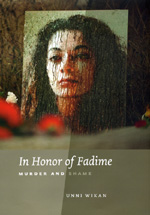Creating a public debate about ‘Honor Killing’

As an article in the November London Review of Books points out, the term “honor killing” is relatively new to the western legal system, but in recent years it has increasingly come into play as cases of filicide in Middle Eastern immigrant communities—often motivated by inter-generational culture clashes over arranged marriages—become more common. To explore this topic the LRB article cites several recent books on the subject including Unni Wikan’s In Honor of Fadime: Murder and Shame—the tragic tale of Kurdish emigre Fadime Sahindal, murdered in Uppsala, Sweden in 2002 by her father because of her relationship with a man outside of their community—a tragedy compunded by her efforts to avoid such a fate by bringing the issue to the public’s attention. As Jacqueline Rose writes for the LRB:
Fadime is remarkable for the way she went public. She secured convictions against her father and brother for threatening to kill her, and then again against her brother for seriously assaulting her during a return visit to Uppsala: he was given a five-month prison sentence.…
Fadime’s successes in court gave her every reason to believe that her boldness was paying off. A month before her father and brother were due to be sentenced, she appeared with Patrik on television; they talked about their love and the threats against them. Fadime sought publicity in the belief that it would save her life: ‘Perhaps they won’t dare to kill me now that so many people know who I am!’ Two months before her death, in November 2001, she agreed, after first refusing, to address a seminar in the Swedish parliament organised by the Violence Against Women network. In front of an audience of 350, she described her turn to the mass media as her ‘last chance’. She had hoped to create a public debate about the problems of girls from immigrant families. But she also recognised that what she called the ‘media circus’ had got out of control. Fadime had become a ‘national celebrity’. For her sister Nebile, it was this that drove their father to violence, and made him sick (that he was sick would be the grounds for his defence).
There is… something contradictory in the idea that someone could ‘go for celebrity status in an attempt to protect herself’ (celebrity always contains a potential element of shame). But if this case is so powerful, and more than justifies the meticulous attention Wikan gives to it, it is because Fadime is also driven by another vision of social obligation. She is speaking for the invisible women of her community.… Each of these three books can be read as a form of devotion (Wikan’s is literally written ‘in honour’ of her subject): they are at once tributes and campaigns. To write about honour killing is in the first instance simply to demand that these crimes be talked about and seen. Viewed in these terms, Fadime’s self-exposure is a kind of sharing and an act of love: ‘I gave voice, and lent face.’
For more read the complete article on the LRB website and read this excerpt from the book.